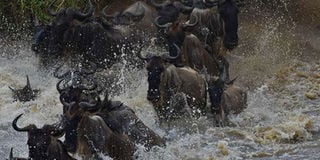Covid-19 stifles Mara wildebeest spectacle

Herds of wildebeest cross Mara River in Narok County on September 4, 2015. PHOTO | AFP
What you need to know:
- Migration is witnessed by thousands of tourists every year.
- More than two million wildebeest are expected to cross over from the Serengeti National Park in Tanzania.
- Hotels, lodges and tented camps in Maasai Mara have remained closed since March due to the Covid-19 pandemic.
- The employees of these facilities have also been sent home, leaving the hotel pools and other facilities to be enjoyed by the wildlife.
The annual wildebeest migration has kicked off in the Maasai Mara Game Reserve with no tourists to witness the spectacle
More than two million wildebeest are expected to cross over from the Serengeti National Park in Tanzania.
Hotels, lodges and tented camps in Maasai Mara have remained closed since March due to the Covid-19 pandemic.
The employees of these facilities have also been sent home, leaving the hotel pools and other facilities to be enjoyed by the wildlife.
Traditionally, the migration has lit up tourism in the country, with thousands of tourists visiting the reserve to witness the animals crossing over.
The wildebeest, also known as gnu, is a stocky ox-like African antelope with a drooping mane and beard, a long tufted tail and curved horn. They are usually accompanied by zebras as they stampede across the River Gate tributary into the Mara.
“The epic migration started two days ago and is expected to go on through October. But this time round there are no loads of tourists at crossing points to witness the natural phenomena,” said Ms Christine Dapash, the Mara game reserve county administrator.
Ms Dapash said the first herd crossed the Sand River Gate crossing point on Tuesday, kicking off the spectacle.
The migration is the world’s largest migration, involving more than two million animals in search of greener pastures in Kenya. It usually starts in Mid-June and ends in October. The annual event is so great a spectacle that it has been termed an eighth wonder of the world.
The yearly migration begins in the south of the Serengeti, where more than half a million calves are born between January and March. But when the rains end in May or June, the land dries fast and the grazers must move on, heading for their dry season refuge in the Mara.
After entering the Mara, the animals head northwards towards River Talek, where they graze and mate.
The migration also brings with it lions, cheetahs, leopards, hyenas and other carnivores that prey on the wildebeest, with wildlife lovers enjoying dramatic hunting scenes, with the tall grass giving the hunters ample camouflage.
From July to October, the wildebeest move between the western and eastern sides of the river, crossing it at different points almost daily.
The game reserve’s chief warden James ole Sindiyio said March, April and May are traditionally low tourist months, but never before in its almost 60-year existence has the 1,510 square-kilometre reserve been as deserted as it is presently.
“The hotels, lodges and tented camps in the Mara have no visitors, compared to occupation rates of between 90 and 100 per cent during the normal peak season,” said Mr Sindiyio.
Mr Felix Migoya of the East Africa Tour Drivers and Guides Association said tour operators have taken a big hit from the pandemic after they were forced to stop operations.
Cancellation of flights
He said the situation has been worsened by the cancellation of local and international flights.
Narok Governor Samuel Tunai had earlier warned that the closure of the hotels at the reserve would hit the county’s revenues.
The governor, who is also the Council of Governors’ tourism committee chairman, said his government could suffer losses amounting to Sh2.4 billion.
“With no tourists coming to the Maasai Mara, our revenue collection is at zero, booking is at zero, all hotels are shut down due to the international and domestic markets shutdown. The migration will this time happen without anybody to witness it,” said Mr Tunai.
Even as hotels remain closed, Mr Tunai affirmed that security personnel are still protecting the wildlife from poachers.





